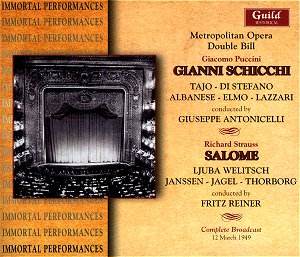All the Guild ‘Immortal Performances’ series of historical
opera performances arrived for review at once. So, having listened to
the issue of Montemezzi’s
‘L’Amore Dei Tre Re’ over a couple of days (and being bowled over
by the performance and quality of the 1941 broadcast), I made my notes
and moved straight to this somewhat unusual double from 1949. I was
underwhelmed by both the performance and recording of the Schicchi to
the extent that I put it aside for a week to clear my palate, as it
were, of the outstanding Montemezzi. On return, I still found the recording
disappointingly shallow in parts and the performance mediocre. As Richard
Caniell points out in the booklet notes, the success of any Schicchi
centres on the performance of the title role. I have known Tajo’s singing
since the days of Cetra LPs (the ‘Green Label’ versions!). His voice
is individual and he covers and colours his tone well, but compared
with Gobbi (Caniell prefers Taddei) on the justifiably famous EMI disc
he misses too many tricks. Given the nature of the opera, much of it
near speech-song and a lot of peripheral activity, this is a serious
flaw.
The presence of di Stefano and Albanese is luxury casting.
She has the main aria (arietta in fact) of the opera, the famous ‘O
mio babbino caro’ (CD1 tr9) and is justifiably, and loudly, applauded,
although sounding somewhat mature for the part. Di Stefano’s contribution
is all too brief and like the other minor parts is adequately taken,
whilst the conducting lacks sparkle. No, you wouldn’t buy these discs
for this performance, but it was, and is on this issue, part of a double
bill, so what of the melodramatic partner, which had its premiere (1905)
thirteen years before Schicchi?
I expect it will be the reputation and renowned performance
of Ljuba Welitsch as Strauss’s complex Salome that will draw purchasers
as much as the overall performance, although with Reiner conducting
and Janssen as Jochanaan it has many virtues. Welitsch had sung the
part of Salome at the composer’s 80th birthday celebration
in Vienna in June 1944, but didn’t arrive at the ‘Met’ until 1948 and
she only sang there for five seasons, returning in 1972 for the character
part of the Duchess of Krakenthorp (La Fille du Regiment). She
was a highly dramatic and temperamental singer who gave everything,
vocally and physically, to a performance, which could put strain on
her silvery and often sensuous tone. However, in this performance, at
the height of her vocal and interpretative powers in her portrayal of
the evil adolescent that is Salome, she is outstanding. With Janssen
a steady and expressive Jochanaan, and Kerstin Thorborg a fearsome Herodias,
she is well matched. This performance, which takes up the whole of CD
2 and 12 minutes of disc 1, justifies the cost of this issue to a purchaser,
whatever the reservations I have expressed about the Schicchi.
The recording sounds better than that for the Schicchi too. Can it be?
The answer might be that being drawn into involvement in the drama of
a flowing and vital performance just makes it seem audibly better.
The booklet is up to the usual good standard of this
series with brief essays about the two operas, track-related synopsis
and artist profiles; all by Richard Caniell who also carried out the
re-creation and restoration.
Robert J. Farr

